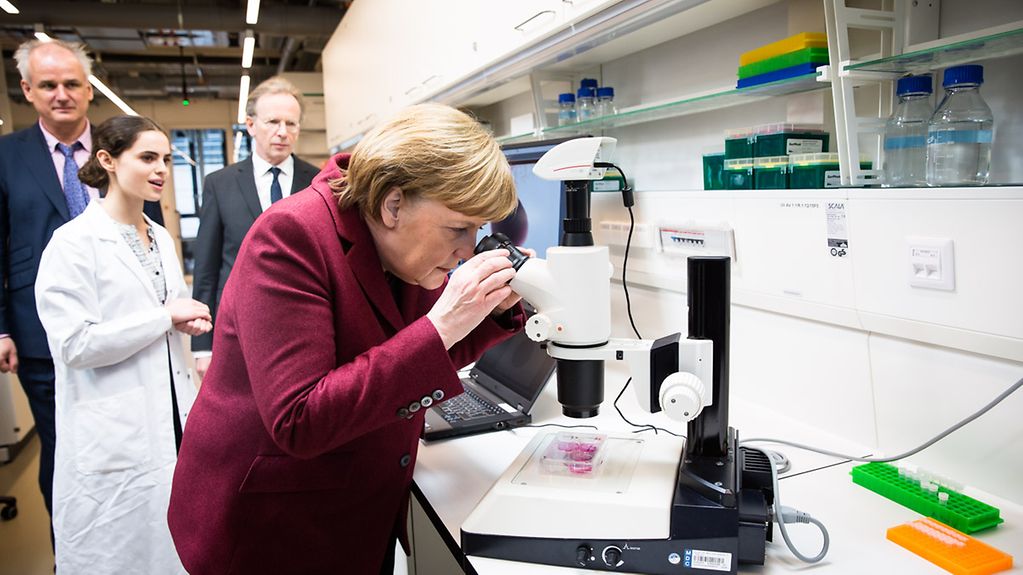Berlin Institute for Medical Systems Biology
People have always dreamed of enjoying a long life in good health. This wish is also the goal of research scientists at the Berlin Institute for Medical Systems Biology. They will soon be working at their new research centre in the heart of Berlin. At the opening ceremony, Chancellor Angela Merkel got to know the new building.
2 min reading time

Chancellor Angela Merkel finds out more about the molecular research being conducted at BIMSB
Photo: Bundesregierung/Steins
Since the very beginnings of modern medicine, scientists have systematically worked to give people a longer, healthier life. Thanks to modern technologies, research scientists today are consistently increasing their understanding of how a healthy organism functions and how diseases emerge.
At the Berlin Institute for Medical Systems Biology (BIMSB) research scientists focus on single cells to find out how they are controlled.
Success through single cell biology
By examining the diseased cells of patients, individual pathologies can be identified. Applied research makes it possible to devise more targeted and thus more successful therapies. The American journal Science 2018 declared this research in the field of single cell biology to be the "breakthrough of the year".
Chancellor Angela Merkel praised the research scientists at the Berlin Institute for Medical Systems Biology, who have been pivotal in this pioneering research. "That is something you can justly be proud of."
Making interdisciplinary research the standard
The Chancellor was also impressed by the volume of data recorded, which is only possible with the help of artificial intelligence and machine learning. The Berlin Institute for Medical Systems Biology is an excellent example of how "leading edge research in many fields is only conceivable in an interdisciplinary environment," stressed Angela Merkel.
The success of the Berlin Institute for Medical Systems Biology also illustrates the performance and effectiveness of the Max Delbrück Center, declared the Chancellor. BIMSB is part of this biomedical research centre. Angela Merkel encouraged research scientists to work increasingly across disciplinary divides, with other institutions and at transnational level. This must become standard practice, she said.
The Max Delbrück Center for Molecular Medicine is one of Germany’s leading centres for biomedical research. It was founded in 1992 with the aim of translating the results of molecular research into practical medicine.
Focus on health research
One main thrust of the work of the German government is research in the health sector. Within the scope of a framework programme, the government identifies the guidelines that are to apply to funding for medical research in Germany over the next ten years. Research must foster good human health and quality of life. This is to be consistently developed and extended, said the Chancellor.
"In the framework programme we also specify which new technologies, like digitalisation, artificial intelligence and new molecular biology techniques, will be key to medical progress," said Angela Merkel. For this top specialists are needed, which is why the German government will also be providing funding for this.